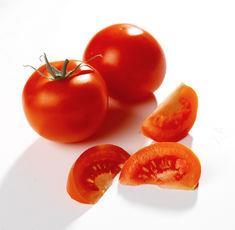
Scientists have sequenced the genome of the domesticated tomato in a breakthrough that could lower production costs for growers of tomato crops.
The sequences provide a detailed look at the functions of the tomato genome and reveal the order, orientation and relative positions of its 35,000 genes.
Scientists at the French National Institute for Agricultural Research (INRA) have worked in co-ordination with the Tomato Genome Consortium on the project.
INRA’s Mondher Bouzayen, lead scientist on the project, told FPJ this week that the research could lead to disease-free tomato crops for UK growers.
Bouzayen explained: “The sequencing of the tomato genome will enable us and others to look at what genes are involved in combating pest, bacterial, fungal and viral diseases. Now we can look at what genome fragments inherit the resistance to a particular disease, which will allow us to then duplicate them in the right areas, so a tomato has more of the healthy gene to remain disease free.”
Bouzayen believes in the long term tomato growers will not have to use pesticides. “Things will progress step by step until reaching the ideal situation where we get genotypes that allow the industry to grow tomatoes in a safe condition with no more need for pesticides, and therefore much lower production costs.”
The work may also speed up improvement to other crops, particularly the tomato’s Solanaceae relative. The group is the world’s most important vegetable plant family in terms of economic value and production volume, and includes potato, pepper and eggplant.
Bouzayen added: “The issue for other crops grown in Europe, particularly of the Solanceae family, is the yield is dependent on efficient flower pollination and fertilisation, which is strongly impacted by high or low temperatures and humidity."
This genome information will identify the signals and genes of the fruit set ie. the transition of flower to fruit, and as a result we can improve design genotypes and eradicate the issue meaning growers can maintain the high yield even in hot temperatures.”



